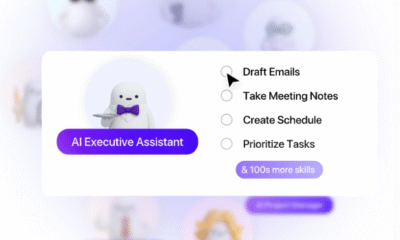Tools & Platforms
Vidu updates Q1 AI video generation model to handle up to seven image inputs

Vidu AI, a generative artificial intelligence video platform developed by Chinese firm ShengShu Technology, today announced an update to its latest Q1 model featuring an advanced “reference-to-video” feature powered by semantic understanding.
The company is developing a generative video AI model that competes with OpenAI’s Sora, which can produce vivid video sequences. The update allows for richer video context for the production of video scenes involving multiple elements that remain the same between clips from frame to frame.
Users can now upload up to seven reference images and include a prompt that combines them for the AI to use in a scene. For example, the AI uses what the company calls “semantic understanding” to reference the images and relate them to the text prompt and even infer missing elements to generate key objects.
“This update breaks through the limits of what creators thought they could do with AI video,” said Chief Executive Luo Yihang. “We’re getting closer to enabling users to create fully realized scenes, complete with a detailed cast of characters, objects, and backgrounds, by expanding multi-image referencing to support up to seven inputs.”
For example, a user could upload an image of a young woman in a green dress, an idyllic forest scene and an owl. Then input the prompt: “The woman plays the violin in the forest while the owl flies down and lands on a nearby branch at sunrise.”
Yihang said the Vidu Q1 semantic core engine will generate a violin in her hands, preserving scene consistency and narrative quality throughout the clip. Using this technology, creators no longer need to face steep technical hurdles when attempting to create complex scenes. A text prompt and images are all they need when producing consistent video scenes.
Vidu is competing with Google LLC’s Veo 3, released in late May. Its generative video capabilities include natural English prompts and reference images alongside a filmmaking tool called Flow, which allows users to manage narrative design to develop entire short AI-generated films that include visuals, special effects and audio, including speech.
ShengShu announced a partnership with Los Angeles-based animation studio Aura Productions in late March to release a 50-episode short film sci-fi anime series fully generated by AI. The project seeks to redefine digital entertainment by using AI capabilities to augment traditional narrative techniques. It is slated for release across major social media platforms this year.
“AI is no longer just a tool; it’s a creative enhancement that allows us to scale production while maintaining artistic integrity,” said D.T. Carpenter, showrunner at Aura, told Variety about the project.
Image: Vidu AI
Support our open free content by sharing and engaging with our content and community.
Join theCUBE Alumni Trust Network
Where Technology Leaders Connect, Share Intelligence & Create Opportunities
11.4k+
CUBE Alumni Network
C-level and Technical
Domain Experts
Connect with 11,413+ industry leaders from our network of tech and business leaders forming a unique trusted network effect.
SiliconANGLE Media is a recognized leader in digital media innovation serving innovative audiences and brands, bringing together cutting-edge technology, influential content, strategic insights and real-time audience engagement. As the parent company of SiliconANGLE, theCUBE Network, theCUBE Research, CUBE365, theCUBE AI and theCUBE SuperStudios — such as those established in Silicon Valley and the New York Stock Exchange (NYSE) — SiliconANGLE Media operates at the intersection of media, technology, and AI. .
Founded by tech visionaries John Furrier and Dave Vellante, SiliconANGLE Media has built a powerful ecosystem of industry-leading digital media brands, with a reach of 15+ million elite tech professionals. The company’s new, proprietary theCUBE AI Video cloud is breaking ground in audience interaction, leveraging theCUBEai.com neural network to help technology companies make data-driven decisions and stay at the forefront of industry conversations.
Tools & Platforms
Cyber A.I. Group Appoints Alex Epshteyn as Chief Innovation Officer

Alex Epshteyn
Cyber A.I. Group, Inc., an emerging growth Cybersecurity, Artificial Intelligence and IT services company engaged in the development of next-generation market disruptive AI-driven Cybersecurity technology, announced today the appointment of Alex Epshteyn as Chief Innovation Officer.
Mr. Epshteyn brings over 28 years of executive leadership and advanced technical expertise in AI, complex systems integration, real-time data visualization and large-scale infrastructure projects. In his new role, he will lead CyberAI’s innovation initiatives, overseeing product strategy, research and development and the continued evolution of CyberAI’s expanding patent portfolio including Sentinel 2.0—the Company’s patent-pending AI-powered Cybersecurity subscription platform.
Working in collaboration with Dr. Peter J. Morales, CyberAI’s Chief Technology Officer / Chief Operating Officer, Mr. Epshteyn will drive efforts to align advanced innovation with enterprise needs and global market expansion. His appointment underscores CyberAI’s commitment to industry leadership, product excellence and the delivery of intelligent Cybersecurity solutions tailored for middle-market companies worldwide.
“Alex is a world-class innovator with an extraordinary ability to design, architect and commercialize cutting-edge technologies,” said A.J. Cervantes, Jr., Executive Chairman at CyberAI. “His deep experience spanning AI and mission-critical infrastructure will play a pivotal role as CyberAI accelerates the launch of our CyberAI Sentinel 2.0 platform and we position the Company for rapid growth and scale.”
Mr. Epshteyn previously served as CEO and CTO of Zignage, a premier real-time data visualization and digital signage company powering clients such as the New York Stock Exchange, Mizuho Bank, BMO and Morgan Stanley. He also founded Ngaged Software, an AI-powered education technology startup whose platform, BriteClass, was deployed at Harvard, MIT, Brandeis and NYU, among other colleges and universities. Earlier in his career, he held senior roles at Hewlett Packard Consulting, SIAC, Arup Consulting and Adler Group, contributing to initiatives that spanned trading systems for the NYSE, national emergency response infrastructure and major transportation hubs including JFK and Penn Station.
“Cyber A.I. Group represents the future of intelligent Cybersecurity and I am honored to join its exceptional leadership team at such a transformative time,” said Mr. Epshteyn. “The opportunity to pioneer AI-driven innovation while delivering secure, scalable and adaptive solutions through CyberAI Sentinel 2.0 is one I greatly look forward to. Together, we can help enterprises navigate an increasingly complex digital threat landscape with confidence and resilience.”
Mr. Epshteyn holds a B.A. with honors in Cognitive Science and Computational Linguistics from Columbia University and completed graduate work at NYU’s Media Lab at the Tandon School of Engineering. He has developed custom software and data analysis tools, while also volunteering at NYU Tandon to mentor undergraduate engineering students. Through his appointment as Chief Innovation Officer, CyberAI strengthens its commitment to delivering next-generation, AI-powered Cybersecurity solutions to a global marketplace.
About Cyber A.I. Group, Inc.
Cyber A.I. Group, Inc. (“CyberAI”) is a next-generation technology company pioneering the development of advanced proprietary platforms at the intersection of Artificial Intelligence and Cybersecurity. With a mission to redefine how organizations protect, predict and respond to digital threats, CyberAI is positioning patent pending technologies that enable autonomous threat detection, adaptive risk mitigation and intelligent system resilience across enterprise and cloud environments as a low-cost alternative for small and medium-sized businesses. At the core of CyberAI’s innovation is a team of world-class technologists, data scientists and Cybersecurity experts dedicated to creating breakthrough solutions that are scalable, secure and globally deployable. The Company’s technologies are designed to address the most urgent and complex challenges facing today’s digital infrastructure, from AI-driven security orchestration to autonomous anomaly detection and predictive analytics for critical systems. CyberAI’s commitment to continuous innovation and deep IP development is positioning it at the critical intersection of AI and the global Cybersecurity landscape. By fusing Artificial Intelligence with real-world cyber defense expertise, the Company aims to set new standards for intelligent infrastructure protection and digital trust. For more information, please visit: cyberaigroup.io
Tools & Platforms
The Rewards—And Risks—Of Using AI In The Classroom

September 16, 2025
By Elizabeth Tucker–
Many of us lacking experience with Artificial Intelligence (AI) find it unnerving. There is the prospect that it can do everything we do, only better—or at least adequately and cheaper. “You won’t be replaced by AI; you’ll be replaced by someone who knows how to use AI better,” quoted Irvington Superintendent Mara Rasevic in a recent conversation. If AI is changing the contours of the workforce, then schools need to train students to use it effectively. The American Federation of Teachers (AFT) this summer established the National Academy for AI Instruction so that teachers can stay on top of their new responsibility to impart AI literacy and also learn how to employ it to make their own working routines more efficient. The AFT has also published Commonsense Guardrails for Using Advanced Technology in Schools, now already in a revised edition.
Jerrod Blair, Director of Technology and Integration in the Irvington school district, articulated an overview of how teachers there are using AI. “Some teachers are exploring how AI can save time on routine tasks, like generating practice questions, lesson ideas, or feedback prompts, so they can focus more on engaging with students,” he said. “Others are experimenting with AI as a discussion starter in class, for example, asking students to evaluate an AI-generated response for accuracy, bias, or completeness.”
Support our Sponsors
Many districts, including those in the rivertowns, are using the AI teaching platform MagicSchool. Hastings has introduced it at the elementary level. In Sleepy Hollow, according to Technology Integration Specialist Jean O’Brien, AI is being used in instruction from elementary to high school and in math and science classes as well as in the humanities.
At Sleepy Hollow High School, social studies teacher Alyson Nawrocki finds MagicSchool especially useful in providing students individualized feedback on their writing. “The AI feedback is never in place of teacher feedback,” Nawrocki says, “but it’s useful as a checkpoint if I’m conferencing with another student so the rest of the class can keep working productively.”
MagicSchool assesses students’ writing according to Nawrocki’s own rubric. For example, under “thesis,” the AI software might opine that the writing is clear but too general, or under “analysis,” it might note that the writing successfully reports what happened but needs to explain why those events mattered. Students can revise on their own and then submit a final version to Nawrocki to read.

Another feature MagicSchool offers is a text leveler, which adjusts a text for different reading levels. Blair says, “This doesn’t replace the original text, but it gives teachers another way to ensure that every student can engage meaningfully with the material. For example, a teacher might provide the original text alongside a leveled version so that students can build confidence and gradually work toward the more complex version.”
MagicSchool’s character chatbot allows students to engage in conversation with figures from history. In Nawrocki’s class, students interviewed a World War I soldier about his experience. In another assignment, her students were assigned to read an article about early human migration into North America and then, using details learned from the reading, instruct the image-generating Canva AI to create a magazine cover picturing its contents.
When asked about the technology’s drawbacks, Nawrocki allows that “some students begin to rely too heavily on AI. This can discourage them from taking creative or intellectual risks, which are essential parts of the learning process.”
Then, of course, there is the temptation to use AI to fabricate homework assignments. To counteract this, Nawrocki says, “I no longer assign traditional ‘original’ homework that could easily be completed by a tool. Instead, I design assignments that require students . . . to show their thinking process. . . .The focus is less on producing a polished product at home and more on engaging in authentic skill-building that can be observed and assessed directly.” She might ask her students to relate their homework to the day’s lesson or illustrate historical processes in a drawing or diagram, rather than answer a straight question in writing, as would lend itself to generation by AI.
According to Jerrod Blair, many Irvington teachers as well “are thoughtfully adapting their assignments to reflect the reality that students have access to AI. This doesn’t mean starting from scratch; instead, it’s about asking deeper questions, emphasizing process and critical thinking, and creating opportunities for students to demonstrate their learning in multiple ways.” But also, Blair says, “the district sees this as an opportunity to teach students how to use emerging technologies ethically.”
Read or leave a comment on this story…
Tools & Platforms
DRUID AI Raises $31 Million Series C

DRUID AI today announced it has secured $31 million in Series C financing to advance the global expansion of its enterprise-ready agentic AI platform under the leadership of its new CEO Joseph Kim. The strategic investment – which will advance DRUID AI’s mission to empower companies to create, manage, and orchestrate conversational AI agents – was led by Cipio Partners, with participation from TQ Ventures, Karma Ventures, Smedvig, and Hoxton Ventures.
“This investment is both a testament to DRUID AI’s success and a catalyst to elevate businesses globally through the power of agentic AI,” said Kim. “Customer success is what it’s all about, and delivering real business outcomes requires understanding companies’ pain points and introducing innovations that help those customers address their complex challenges. That’s the DRUID AI way, and now we’re bringing it to the world through this new phase of global growth.”
Roland Dennert, manager partner at Cipio Partners, a premier global growth equity fund, explained: “At Cipio Partners, we focus on supporting growth-stage technology companies that have achieved product-market fit and are ready to scale. DRUID AI aligns perfectly with our investment strategy – offering a differentiated, AI-based product in a vast and rapidly growing market. Our investment will help accelerate DRUID AI’s expansion into the U.S. and elsewhere, fuel further technological advancements, and strengthen its position as a global leader in enterprise AI solutions. We are excited to partner with DRUID AI on its journey and look forward to supporting the company in shaping the future of enterprise AI-driven interactions.”
Kim’s proven track record in leading high-performance teams and scaling AI-driven technology businesses ideally positions him to spearhead that effort. He has more than two decades of operating executive experience in application, infrastructure, and security industries. Most recently, he was CEO of Sumo Logic. He serves on the boards of directors of SmartBear and Andela. In addition, he was a senior operating partner at private equity firm Francisco Partners, CPTO at Citrix, SolarWinds, and Hewlett Packard Enterprise, and chief architect at GE.
DRUID AI cofounder and Chief Operating Officer Andreea Plesea, who had been interim CEO, commented: “I am delighted Joseph is taking the reins as CEO to drive our next level of growth. His commitment to customer success and developing the exact solutions customers need is in total sync with the approach that has fueled our progress and positioned us to raise new funds. Joseph and the Series C set up DRUID AI and our clients for expanded innovation and impact.”
The appointment of Kim as CEO and the new funding come on the heels of DRUID AI earning a Challenger spot in the Gartner Magic Quadrant for Conversational AI Platforms for 2025. This is just the latest development validating the maturity of DRUID AI’s platform and its readiness to deliver business results in a market that is experiencing rapid advancement and adoption.
In 2024, DRUID AI grew ARR 2.7x year-over-year. Its award-winning platform has powered more than 1 billion conversations across thousands of agents. In addition, the DRUID AI global partner ecosystem has attracted industry giants Microsoft, Genpact, Cognizant, and Accenture.
DRUID AI is trusted by more than 300 global clients across banking, financial services, government, healthcare, higher education, manufacturing, retail, and telecommunications. Leading organizations such as AXA Insurance, Carrefour, the Food and Drug Administration (FDA), Georgia Southern University, Kmart Australia, Liberty Global Group, MatrixCare, National Health Service, and Orange Auchan have adopted DRUID AI to redefine the way they operate.
Companies have embraced DRUID AI to help teams accelerate digital operations, reduce the complexity of day-to-day work, enhance user experience, and maximize technology ROI. Powered by advanced agentic AI and driven by the DRUID Conductor, its core orchestration engine, the DRUID platform enables businesses to effortlessly deploy AI agents and intelligent apps that streamline processes, integrate seamlessly with existing systems, and fulfill complex requests efficiently. DRUID AI’s end-to-end platform delivers 98% first response accuracy.
“At Georgia Southern, we recognized that to truly meet the needs of today’s digital native students, we needed to offer dynamic and accurate real-time support that would solve their issues on the spot,” said Ashlea Anderson, CIO at Georgia Southern University. “By leveraging DRUID AI’s platform, we’ve created personalized and intuitive experiences to support students throughout their academic journeys, increasing enrollment and student retention. The result is a more efficient, connected campus where students feel supported, engaged, and better positioned to succeed.”
To learn more, visit www.druidai.com.
About DRUID AI
DRUID AI (druidai.com) is an end-to-end enterprise-grade AI platform that enables lightning-fast development and deployment of AI agents, knowledge bases, and intelligent apps for teams looking to automate business processes and improve technology ROI. DRUID AI Agents enable personalized, omnichannel, and secure interactions while seamlessly integrating with existing business systems. Since 2018, DRUID AI has been actively pursuing its vision of providing each employee with an intelligent virtual assistant, establishing an extensive partner network of over 200 partners, and servicing more than 300 clients worldwide.
-

 Business3 weeks ago
Business3 weeks agoThe Guardian view on Trump and the Fed: independence is no substitute for accountability | Editorial
-
Tools & Platforms1 month ago
Building Trust in Military AI Starts with Opening the Black Box – War on the Rocks
-

 Ethics & Policy2 months ago
Ethics & Policy2 months agoSDAIA Supports Saudi Arabia’s Leadership in Shaping Global AI Ethics, Policy, and Research – وكالة الأنباء السعودية
-

 Events & Conferences4 months ago
Events & Conferences4 months agoJourney to 1000 models: Scaling Instagram’s recommendation system
-

 Jobs & Careers3 months ago
Jobs & Careers3 months agoMumbai-based Perplexity Alternative Has 60k+ Users Without Funding
-

 Podcasts & Talks2 months ago
Podcasts & Talks2 months agoHappy 4th of July! 🎆 Made with Veo 3 in Gemini
-

 Education3 months ago
Education3 months agoVEX Robotics launches AI-powered classroom robotics system
-

 Education2 months ago
Education2 months agoMacron says UK and France have duty to tackle illegal migration ‘with humanity, solidarity and firmness’ – UK politics live | Politics
-

 Podcasts & Talks2 months ago
Podcasts & Talks2 months agoOpenAI 🤝 @teamganassi
-

 Funding & Business3 months ago
Funding & Business3 months agoKayak and Expedia race to build AI travel agents that turn social posts into itineraries

















